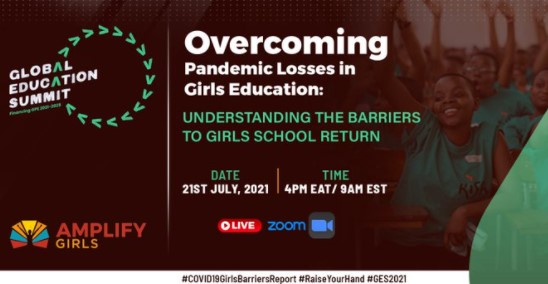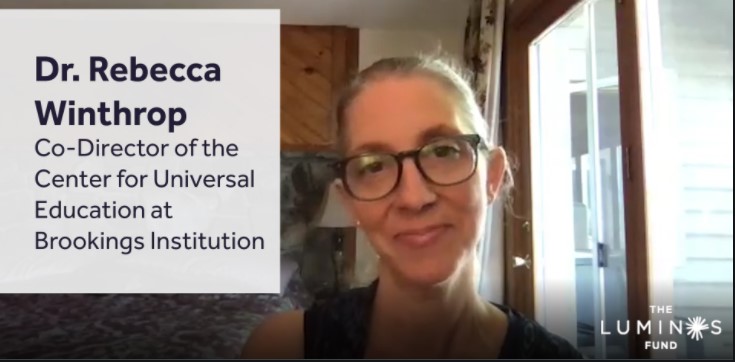

On July 21, 2021, Amplify Girls held a webinar to report on the results of critical research performed beginning in October 2020 by a collective of their members. on the impact of COVID-19. The purpose of the study was to understand the barriers adolescent girls face for returning to school post-COVID-19 and included girls in the conversation about their future with a goal of humanizing the statistics. Anika Jane Dorothy, East Africa Coordinator for Amplify Girls, moderated the discussion.
The Study
132 million girls were out of school even before COVID. The pandemic is interrupting the fragile progress on girls’ education. The scale of the impact of the pandemic on girls is daunting. To try to begin to understand this impact, research was conducted in four East African countries, Kenya, Tanzania, Rwanda, and Uganda and included 382 adolescent girls. Methodology was 35 focus groups and 108 in-depth interviews. Both girls who plan to return to school and girls who dropped out of school participated.
Key Takeaways
(1) Pregnancy was the biggest driver of girls dropping out of school, reported as the primary reason by 50% of girls. Girls engaged in transactional sex during the pandemic for a variety of reasons, but chiefly for funds to fulfill their most basic needs.
61% – food, clothing, soap/lotion
19% – menstrual hygiene supplies
9% – school fees, luxury clothing
6% – phones/technology
(2) Culturally, there is still social stigma among peers and school communities regarding teen pregnancy and motherhood.
While Uganda has directed that pregnant or nursing girls must be able to return to school, this article illustrates the complexity of the situation. Addressing this debate, our colleagues from Girl Up Uganda had this to say:
“Let the girls speak for themselves. If these girls feel that they can return to school, let’s support them.
Instead, let’s have a conversation of creating safer spaces for girls in school for them to return.”
Monica Nyiraguhabwa, Executive Director, Girl Up Uganda

5 Barriers to Returning to School

Physical: Unsupported learning environment, chores, lack of access to technology.
Economic: Taking care of family (possible loss of guardian), food insecurity, lack of funds for school fees/materials.
Health: Pregnancy, lack of access to health information and services (those were available at school).
Social: Negative attitudes from home and community, increased home responsibilities.
Personal: All of these barriers combine to a giant, crushing, psychosocial barrier – loss of confidence and hope.
Call to Action
It is more important than ever to invest in holistic services to support girls. Amplify campaigns for increased support for grassroots organizations that understand and gain trust in communities. Community driven organizations are best positioned to offer support and they all need help paying school fees. In addition, it is vital to get this research into the hands of policymakers. It will take entire ecosystem of organizations, funders, and governments to get girls back to school. It needs to be part of the national conversation in every country.
Learn about the Girls Education Accelerator.
The girls themselves made recommendations for how to overcome these barriers. More than half suggested direct economic intervention/providing material resources – in other words, financial support for school fees and vocational training.
Other ideas:
- Change social norms and policies regarding teen pregnancy and provide pathways for pregnant girls to return to school.
- Provide increased psychosocial support. The pandemic has been a source of physical and emotional trauma for many.
- Develop effective sexual reproductive health initiatives in and out of school.
- Design no tech or low-tech remote learning services to reach the most vulnerable girls.

Amplify Girls is a research-based advocacy group that campaigns for locally led girls empowerment.
It’s mission: to amplify the voices, work and collective impact of community-driven organizations focused on investing in the power and potential of adolescent girls.
This article is a great summary of Amplify’s research on education barriers for girls. Read the full report.
“Build Back Better”
The COVID-19 pandemic should be considered an opportunity for governments to hit restart on their educational systems. Watch an interview on this topic with education expert Rebecca Winthrop, who calls this a “leapfrog moment.” She advises Education Ministers to look to the “unlikely education allies” for expertise and content and to “be open to what has bubbled up and emerged” in order to create a “powered up school.”
Inequality has gotten even bigger during COVID and children at the margins are the least reached and the hardest to serve due to the digital divide. A digital interface must be interactive. You don’t need internet connectivity to still use a tablet loaded with content. No teacher required!
The Global Education Summit took place on July 28-29, 2021 in London. Watch videos from the conference that address the education reset and gender equality in and through education.

Credit for Feature Photo: Global Citizen


